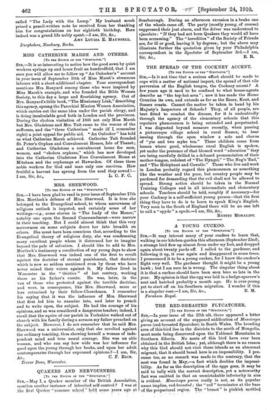MRS. SHERWOOD.
[To THE EDITOR OF THE "SPECTATOR."]
have been glad to read in your issue of September 17th Mrs. Mortlock's defence of Mrs. Sherwood. It is true she belonged to the Evangelical school, to whom narrowness of religious outlook is imputed, and certainly some of her writings—e.g., some stories in "The Lady of the Manor," notably one upon the Second Commandment—were narrow in their teaching. But I could almost think that this very narrowness on some subjects drove her into breadth on others. She must have been conscious that, according to the Evangelical theory of religious duty, she was condemning many excellent people whom it distressed her to imagine beyond the pale of salvation. I should like to add to Mrs. Mortlock's testimony a recollection of my young days to show that Mrs. Sherwood was indeed one of the first to revolt against the doctrine of eternal punishment, that doctrine which is now so seldom mentioned even by those who have never raised their voices against it. My father lived in Worcester in the " thirties " of last century, working there as his father's curate. He was, later, in the van of those who protested against the terrible doctrine, and were, in consequence, like Mrs. Sherwood, more or less ostracised by their fellow-Churchmen. I remember his saying that it was the influence of Mrs. Sherwood that first led him to examine into, and later to preach and to write upon, the subject. He had the courage of his opinions, and so was considered a dangerous teacher; indeed, I recall that the squire of our parish in Yorkshire walked out of church with his family during a sermon my father preached on the subject. However, I do not remember that be said Mrs. Sherwood was a universalist, only that she revolted against the ordinary teaching, thus showing herself a woman of inde- pendent mind and true moral courage. She was an able woman, and who can say how wide was her influence for good upon the young through her books, and upon her adult contemporaries through her expressed opinions P—I am, Sir, C. F. RICE. Trevor Dene, Worcester.










































 Previous page
Previous page